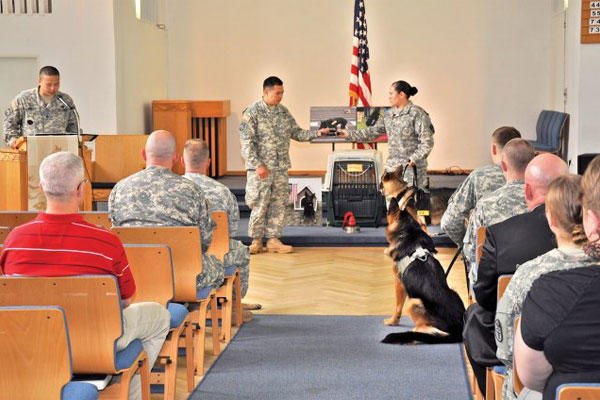WIESBADEN, Germany - One of the best memories Spc. Veronica Pruhs has of Military Working Dog Linda is the day they were on patrol and Linda trotted over to a car so she could get a better smell through a window that was open a crack.
Linda indicated there were drugs inside the car, and she was correct. Military Police officers found two grams of marijuana inside the car's center console. "She knew her job and she was really sweet," said Pruhs, who worked with Linda for 10 months.
Pruhs had nothing but fond memories of the 6-year-old German Shepherd after Linda's memorial ceremony at the Clay Kaserne Chapel May 7. She died April 26 due to medical complications from cancer, and had worked as a narcotics detection dog for the 525th Military Working Dog Detachment in Wiesbaden for six years.
About 50 people attended Linda's ceremony, which included a rifle salute from the attachment's honor guard. Chaplain (Maj.) Craig Bickel, deputy U.S. Army Garrison Wiesbaden chaplain, presided. "Her faith in service is a model for all Soldiers," he said during his benediction. "With heavy hearts in her death, today we want to honor her service."
Sgt. Calvin Aguilar, Linda's most recent handler, also recalled Linda fondly.
"What they say is that you learn something from every dog," Aguilar said. "Linda would teach you a lot. She knew how to play the game. She knew what she needed to do and where she needed to go. She was an extremely easy dog to work with."
Sgt. 1st Class Hardenio Abdon, Wiesbaden's kennel master, said the Quartermaster Corps started the Military Working Dog program during World War II, not long after the attack on Pearl Harbor.
By 1942 nearly 10,000 dogs were trained for the Army, Navy, Marine Corps and Coast Guard, Abdon said. In 1951, the program moved to the Military Police Corps.
During the Vietnam War, the U.S. War Dog Association estimates that dogs and their handlers saved more than 10,000 lives, Abdon said. "These war dogs were used as messengers, patrol dogs, scouts, trackers and as sentry dogs," he said.
In 1952, the U.S. Air Force approved formal patrol dog training at Lackland Air Force Base, as part of the Secured Police Dog Training School, and that is where all dogs receive their initial training today, Abdon said.
Linda arrived at Wiesbaden kennels in Jan. 2009, and conducted more than 100 health and welfare operations, Abdon said.
Six dog handlers, who are trained military police officers, and one kennel master are based in Wiesbaden, Abdon said.
During the ceremony, Pruhs removed Linda's collar from the Fallen Warrior Memorial on the chapel's altar and handed it to Aguilar to symbolize the dog's final rest.
Pruhs then read the poem, "The Guardians of the Night," which reads in part, "And when our time together is done/ And you move on in the world/ Remember me with kind thoughts and tales,/ For a time we were unbeatable,/ Nothing passed among us undetected."


























